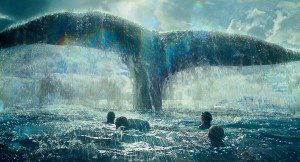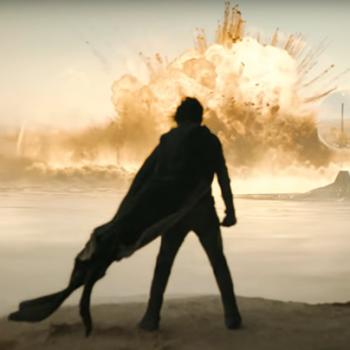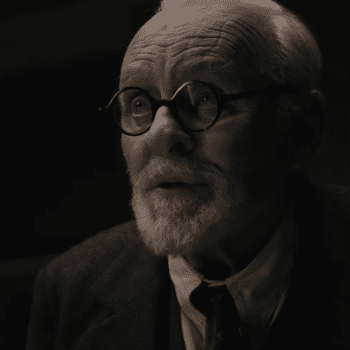
In the Heart of the Sea gets under your skin. It’s hard for movies to stand out in December, surrounded as they are by Oscar contenders and box-office heavyweights. But a good movie sticks with you. And I’ve been noodling on this one for a couple of days.
Directed by Ron Howard, In the Heart of the Sea is based on the true story of the whaling ship The Essex (and, by extension, the non-fiction book by Nathaniel Philbrick). The tale of the Essex apparently was the inspiration behind Herman Melville’s famed novel Moby Dick: Indeed, the movie begins with Melville (played by Ben Whishaw) trying to pry loose the real story from Tom Nickerson (Brendan Gleeson), the last survivor of the ill-fated Essex.
Nickerson tells Melville about George Pollard (Benjamin Walker), the Essex’s inexperienced captain, and Owen Chase (Chris Hemsworth), the dashing first mate—and how the two of them bickered like an old, unhappy married couple. He talks about the ship’s struggles in finding quarry, and how rumor sent them to practically unexplored, faraway waters supposedly teeming with whales. He confesses terrible secrets about how he and others lived after the Essex was sunk, and how they finally made it home.
But at the center of the tale was the Whale. Not a standard 50-foot sperm whale, mind you, which whalers had been harpooning and butchering for their oil for years. No, Nickerson talks about the White Whale—a massive leviathan unlike anything they’d ever seen. Nickerson calls it a demon. And perhaps many of the sailors would agree.
But is it? Or is it an avatar of something greater, more mysterious? Or is it … just a whale?
It’s not just me asking the question, incidentally. It’s the movie itself.
A theological undercurrent follows this movie throughout its run. Before the ship even leaves port, it is prayed over by a handful of devout Nantucket citizens: They ask God to keep the crew safe and give thanks for his creation, “the mighty whale.” It’s the whale’s oil, after all, that fuels the country’s lanterns and powers Nantucket’s economy. Save the whales? Pish. The whales are saving them—from literal and financial darkness.
Hey, these Nantucketers knew their Bible. I’m sure they were plenty familiar with Gen. 1:28, where God tells us to “fill the earth and subdue it and have dominion over the fish of the sea ….” That was pretty good advice back in 1820s America, when nature was often trying to kill you. Subduing the earth was pretty essential to feeding your family—and a hedge against a bear feeding on you.
Captain Pollard is a man of the age. God, he tells Chase, wants mankind to “bend nature to our will.” In his line of work, that means killing and harvesting whales. And if some whales happen to be bigger than others … well, you just get a bigger boat.

But by the time Pollard offers these thoughts, it’s pretty obvious that the Essex wasn’t nearly big enough—and Chase wonders whether any ship would be. For him the white whale, and the hardships that follow, are signs that perhaps there’s more to stewardship than just slaughtering whales.
Keep in mind, Chase isn’t some 19th-century environmentalist. He’s seen the fury of nature plenty, and he’s made a good living as a whaler. But when Chase confronts the White Whale, he’s overwhelmed by the sense that we are meddling in things we can’t understand—tinkering in the workshop of the Almighty. “We’re specks,” he says. “Dust.” And eventually, Chase finds himself not trying to bend nature, but marveling at it.
To Chase, the White Whale becomes more than a whale—just as it was in Melville’s Moby Dick. To Captain Ahab, the whale was evil incarnate, a devil of the deep. But other scholars suggest that the whale is, in fact, a symbol for God. Ahab wants nothing more than to destroy it, even if he destroys himself in the process. R.C. Sproul wrote a fantastic essay about the whale, paying close attention to the symbolic importance of Moby Dick’s color:
If the whale embodies everything that is symbolized by whiteness—that which is terrifying; that which is pure; that which is excellent; that which is horrible and ghastly; that which is mysterious and incomprehensible—does he not embody those traits that are found in the fullness of the perfections in the being of God Himself?
Through Chase’s eyes, we come to see the whale as such: Terrible. Beautiful. Mysterious. Pure. Before it—this inherently unknowable and knowing presence—we are but specks. Dust.
In the Bible, God is compared to a king, a judge, a father. We are made in His image, we’re told. But sometimes our reliance on those very human comparisons obscures that God is unfathomable, a transcendent other, with his full nature hidden from us as with the folds of the sea. He loves us as His own children, and yet we cannot look Him full in the face and live.
And so it’s interesting that in Job 41, God compares himself to a Leviathan—a creature who, at times, sounds very much like a whale.
Can you pull in Leviathan with a fishhook
or tie down its tongue with a rope?
… If you lay a hand on it,
you will remember the struggle and never do it again!
Any hope of subduing it is false;
the mere sight of it is overpowering.
No one is fierce enough to rouse it.
Who then is able to stand against me?
Seems a fitting verse to hang on the walls of The Essex II, if you ask me.













